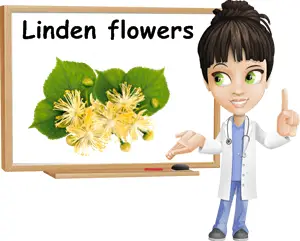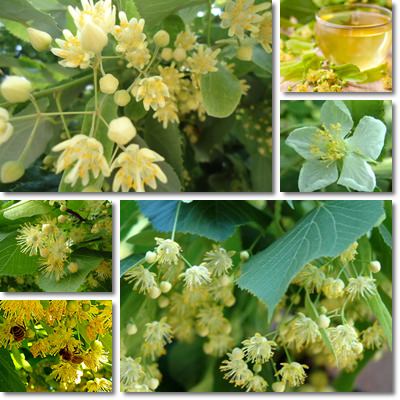Found throughout the temperate world, linden (Tilia europaea) is a longevous sweet-scented tree with an impressive variety of outstanding medicinal properties. Linden flower tea is a fragrant infusion made from the antioxidant-rich flowers of the tree with the same name and used for a wide range of medical conditions. Traditional medical practices recommend drinking hot linden tee to promote sweating, reduce fever, alleviate cough and soothe sore throat pain.
It was and still is an extremely popular herbal remedy for colds, flu and other respiratory problems. Moreover, linden flower tea benefits the digestive and nervous systems as well, being recommended to calm an upset stomach and reduce anxiety and stress due to its mildly sedative properties. It has also been shown to naturally dilate blood vessels, helping reduce blood pressure levels.

What is linden, lime or basswood?
Linden, lime or basswood are generic names for dozens of Tilia species. Most trees of this kind are very longevous, easily reaching 200 years old and continuing to be productive well over their first century of life. Aside from an opulent foliage of heart-shaped leaves and a characteristic sweet perfume that enshrouds streets from corner to corner, linden trees are highly appreciated for their edible flowers (and fruit) which make fragrant infusions and effective herbal remedies.
What does linden taste like?
What do linden (lime, basswood) flowers, leaves and fruit taste like? Linden flowers are sweet and a bit sticky, which is normal considering they an excellent source of pollen and nectar for honey production. Young linden leaves are tender and somewhat sweet; they are best consumed raw, preferably while still buds. As for the fruit, they bear a signature mild sweetness as well and are quite sticky or gummy. Linden trees can be found throughout the temperate regions of Europe, Asia and North America where climatic conditions allowed them to thrive and become genuine symbols of longevity.
Also see the benefits of linden honey.
Varieties of linden:
The most common varieties include:
- Small-leaved Linden (Lime), botanically known as Tilia cordata.
- Large-leaved Linden (Lime), botanically known as Tilia platyphyllos.
- The common lime, resulting from the cross between the above-mentioned species, botanically known as Tilia europaea.
- American Linden, or Tilia americana.
Although the strong fragrance of linden flowers might be bothersome to some and the pollen may trigger their allergies, for those who are not allergic to it, linden can be a source of important health benefits.

What are the benefits of linden flowers?
Here are 6 reasons why linden flowers are good for your health:
Natural remedy for respiratory problems
Linden flower tea is recommended for treating colds, flu, bronchitis and other similar respiratory problems. Not only does it reduce fever by promoting sweating, but it also alleviates cough, reduces sore throat irritation and pain as well as nasal congestion due to it mucolytic action (it helps dissolve mucus). Every other day, drink elderberry or elder flower tea and you will have yourself the most efficient natural cold and flu remedy. Unless allergic – in this case avoid them in all forms and preparations.
Reduce stress and anxiety naturally
Drinking linden flower tea regularly helps reduce anxiety and stress due to the flowers having mild sedative properties. A cup of linden flower infusion every other night before going to bed is a great way to relax yourself and prepare for a good night’s sleep. You can also alternate with lemon balm. Keeping stress levels under control is also important for stopping heart palpitations, a symptom of anxiety disorder.
Good for bloating, flatulence and stomach pain
Preparations made from linden leaves and flowers, such as linden flower tea, combat bloating, reduce flatulence and alleviate stomach pain and painful abdominal cramps. Linden flowers and leaves are a wonderful natural antispasmodic and have been shown to efficiently reduce stomach gas and calm cramps, indigestion and ulcer pain. Moreover, they are great for treating vomiting. Traditionally, linden wood was turned into charcoal and used as activated carbon for treating flatulence or applied topically for reducing cellulite.
Good for gallbladder and liver health
Linden is known to promote gallbladder and liver health. According to several studies, linden (basswood) sapwood extracted from the inner bark of the tree is an efficient natural remedy for gallbladder stones and cleanses the liver.
Lower high blood pressure
Linden sapwood is an efficient diuretic and thus contributes to lowering high blood pressure. In addition to this, it is a great herbal detox remedy for our kidneys. Moreover, being a natural blood vessel dilator, linden sapwood not only helps reduce arterial blood pressure, but is also highly effective in combating headaches.
Rich in antioxidants
Linden flowers especially are a rich source of potent antioxidants such as quercetin, kaempferol, p-coumaric acid (also found in linden honey) and other powerful flavonoids as well as volatile oils such as eugenol, limonene, citral, citronellol and citronellal. While the flavonoids present in linden flowers, leaves and sapwood boast powerful antioxidant, antispasmodic, antifungal and antibacterial properties, the volatile oils responsible for the sweet basswood smell act as a mild sedative and potent anti-anxiety agent.
Conclusion
Overall, linden boasts a series of rather wonderful health benefits. Regular consumption of linden flowers in tea is great for colds, flu, and other respiratory problems, helps calm stomach cramps and ulcer pain, lowers high blood pressure and promotes liver and kidney health. However, due to the lack of research, it might be best to avoid herbal teas during pregnancy, unless your doctor advises you otherwise.
Also, linden flower extracts are present in a variety of beauty products ranging of body lotions to face creams and massage oils. If you have a certain sensitivity to pollen, make sure you undergo a skin prick testing to see if you are allergic to linden flower pollen and byproducts such as the popular linden (basswood) honey. Although I find linden tea very calming for the nerves, I don’t drink it every day and like to alternate between linden, peppermint and a combination of licorice and sea-buckthorn tea.
